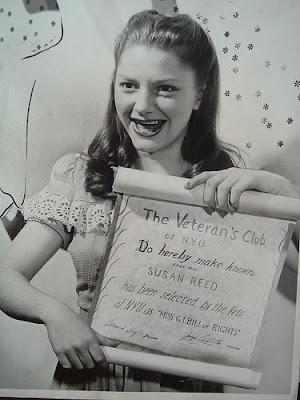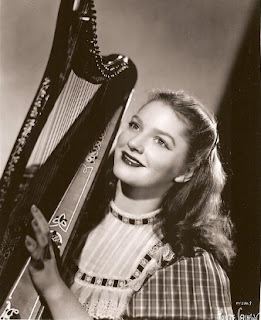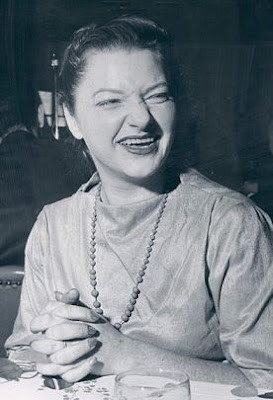Susan Catherine Reed (January 11, 1926 – April 25, 2010) was an American singer, harpist, zitherist and actress. A regular on the New York folk scene, Life magazine dubbed her "the pet of Manhattan nightclubbers" in 1945.
 She was born in Columbia, South Carolina, the daughter of Isadora Bennett and Daniel Reed, respectively a theatre publicist and actor. Folk music collector Carl Sandburg and musician Huddie Ledbetter were family friends, as were visiting Irish actors and musicians from the Abbey Theatre Company. After she moved to New York City with her family.- including her older brother Jared, who also performed,
She was born in Columbia, South Carolina, the daughter of Isadora Bennett and Daniel Reed, respectively a theatre publicist and actor. Folk music collector Carl Sandburg and musician Huddie Ledbetter were family friends, as were visiting Irish actors and musicians from the Abbey Theatre Company. After she moved to New York City with her family.- including her older brother Jared, who also performed, She began singing and playing the zither, harp and autoharp at private parties and for wounded soldiers convalescing in hospitals with renditions of what would become her signature pieces, "Danny Boy", "He Moved Through the Fair", and "Black is the Colour of My True Love's Hair." Although she originally aspired to becoming a painter, she was discovered by Barney Josephson, owner of the Café Society club in Greenwich Village, who booked her to appear
She began singing and playing the zither, harp and autoharp at private parties and for wounded soldiers convalescing in hospitals with renditions of what would become her signature pieces, "Danny Boy", "He Moved Through the Fair", and "Black is the Colour of My True Love's Hair." Although she originally aspired to becoming a painter, she was discovered by Barney Josephson, owner of the Café Society club in Greenwich Village, who booked her to appear there.
Her performances of folk ballads and other traditional songs found immediate success, and she appeared on radio and TV shows with Burl Ives. She made her debut at the Town Hall in New York in 1945, at the age of nineteen, followed by a national tour. She played Broadway in "Billy the Kid", toured with "Finian's Rainbow" and "Brigadoon", and became a regular on the radio, later moving to television on "The Firestone Hour" and similar programs. Reed was seen frequently at New York's Carnegie Hall and Los Angeles' Wilshire Ebell Theatre.
In 1947, Alan Lomax wrote of her, with Burl Ives, Woody Guthrie and Josh White, as one of the foremost performers in the "enthusiasm for native balladry and folklore that is running through the country from coast to coast". In 1948, she appeared with Gene
![]() Krupa in the film Glamour Girl (re-titled Night Club Girl in the UK), in which she played a folk-singing country girl brought to sing in New York nightclubs. The movie directly inspired English folk singers Shirley and Dolly Collins.
Krupa in the film Glamour Girl (re-titled Night Club Girl in the UK), in which she played a folk-singing country girl brought to sing in New York nightclubs. The movie directly inspired English folk singers Shirley and Dolly Collins.
 Krupa in the film Glamour Girl (re-titled Night Club Girl in the UK), in which she played a folk-singing country girl brought to sing in New York nightclubs. The movie directly inspired English folk singers Shirley and Dolly Collins.
Krupa in the film Glamour Girl (re-titled Night Club Girl in the UK), in which she played a folk-singing country girl brought to sing in New York nightclubs. The movie directly inspired English folk singers Shirley and Dolly Collins.Reed appeared regularly on TV and radio in the early and mid 1950s, and recorded for the Columbia, RCA Victor, and Elektra record labels. Her albums included an adaptation of Joseph Canteloube's Chants d'Auvergne (Songs of the Auvergne, 1950),
Susan Reed Sings Old Airs from Ireland, Scotland and England (1954) and Susan Reed (1956). She also acted on TV, and appeared on Broadway in Shooting Star, a musical about Billy the Kid.
Susan Reed Sings Old Airs from Ireland, Scotland and England (1954) and Susan Reed (1956). She also acted on TV, and appeared on Broadway in Shooting Star, a musical about Billy the Kid.
Despite several bestselling albums, her career was somewhat hampered by a perception that she was "too pop for folk and too folk for pop". Reed was the subject of a "Life" magazine cover story on folk music in 1955,and thought it newsworthy to declare that this "chubby freckle-faced redhead ... wears no make-up when performing" but Reed was essentially finished in the music business after she ran afoul of the House Un-American Activities Committee, and was blacklisted as a communist sympathiser.
 Like various other folk artists who had the temerity to go against the grain and actually stand for something, Reed found herself blacklisted in the second half of the 1950s. She thus joined the ranks of Pete Seeger and the other members of the Weavers, and singers like Jo Mapes, who suddenly found themselves persona non grata in most major venues. Reed’s broadcast and recording career came to a halt and her performing eventually followed. She was relegated to whistle-stop engagements in Podunk towns. As a result she ended her professional career in the early 1960s to be with her family in the new York City area.
Like various other folk artists who had the temerity to go against the grain and actually stand for something, Reed found herself blacklisted in the second half of the 1950s. She thus joined the ranks of Pete Seeger and the other members of the Weavers, and singers like Jo Mapes, who suddenly found themselves persona non grata in most major venues. Reed’s broadcast and recording career came to a halt and her performing eventually followed. She was relegated to whistle-stop engagements in Podunk towns. As a result she ended her professional career in the early 1960s to be with her family in the new York City area.Largely withdrawing from public view, she was said to have kept her voice, performing in local venues into her 80s, always starting by saying, “This is a zither.” Out of the limelight, her voice a bit deeper, she still performed at the occasional fund-raiser. “Everyone with an organization who wants to put over brotherhood and peace,” she said, “they just call old Sue.”
She married actor James Karen in 1958; they had one child before divorcing in 1967. She spent her final years establishing an antiques shop in Greenwich Village, and later sold ethnic handicrafts and clothes in Nyack, New York. She was also an accomplished painter. Tom Chapin used several of her paintings on his album covers.
She died of natural causes in 2010 at a Long Island nursing home, at the age of 84.
She died of natural causes in 2010 at a Long Island nursing home, at the age of 84.
(Edited mainly from Wikipedia with a little help from AllMusic, L.A.Times & The Guardian)





